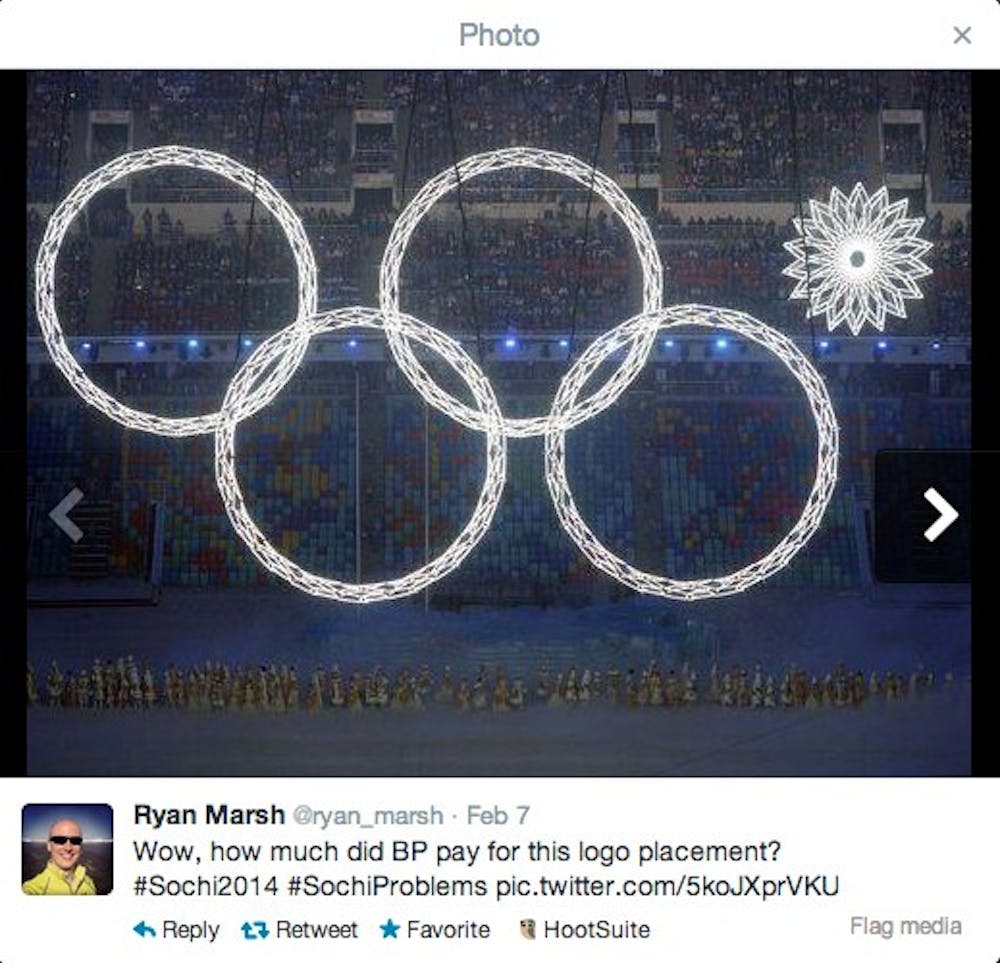So much happens outside Taylor, but what does any of it have to do with you? The world can seem like an overwhelming web of stories, and this column will help you find your place inside it. Sit down with me as we explore the bridges that connect us to the rest of the world.
By Abigail Pollock | EchoThe biggest story trending about the 2014 Olympics is not actually about the Olympics.
It is not about the international athletes or the grueling physical competition.
The stories that have kept the internet buzzing are focused on the supposed unpreparedness of Russia as a host for the Winter Games. Since before the opening ceremonies, reporters have kept up a steady stream of complaints about Sochi, from their unfinished hotel rooms to polluted tap water. Russian signs are mistranslated into English. A reporter finds a stray dog in his hotel room, while at the same time Russia's plan to get rid of the strays is greeted with international protest for being inhumane.
Journalists in Sochi for the Olympics tweet about hotel problems: http://t.co/YXcrorrXHp #SochiProblems #Sochi2014 pic.twitter.com/ULsgSay6RO
- 7NEWS Denver Channel (@DenverChannel) February 5, 2014
On Twitter, athletes and reporters alike have been encouraged to log their negative Sochi experiences and have a public laugh at Russia with the hashtag #Sochiproblems.
Foreign visitors can be harshly critical, and in some sense that is justified. The Olympics are often seen as a chance for a nation to showcase their best and impress the rest of the world. If a country fails to take advantage of that chance, perhaps they should be embarrassed.
No government, nation or culture is perfect, however. Olympic host cities are under intense pressure to hide their social problems behind an expensive, carefully-constructed facade. It's a performance-and that's not inherently wrong.
The issue is that in Russia's process of putting on a good face, valuable aspects of the authentic culture may be lost. And if visitors spend so much time gleefully highlighting a country's flaws, unable to look past their badly hung curtains and see Sochi itself, the important stories may not be told or even seen.
The most valuable Olympic stories are not what is covered up, but what shines through.
Many of the complaints brought up on social media reflect issues that directly impact the daily quality of life of Russia's people. But when a reporter washes her face with bottled water "like a Kardashian," what if she thought about the Russian citizens who are forced to boil tap water for drinking every day, despite the risk of contamination?
American citizens traveling abroad tend to get an ugly reputation, but it doesn't have to be that way. Jay Onrait, a Fox Sports Live anchor, provided a perfect example of cultural openness when he tweeted on his personal account:
Every Olympics I cover changes my perception of the host country and Russia is no different. Wonderful, passionate people and great hosts.
- Jay Onrait (@JayOnrait) February 9, 2014
Great Olympic stories are not limited to Sochi, either. Many of the 2014 athletes have inspiring stories of perseverance and self sacrifice which deserve the spotlight. Take for example Tracy Barnes, who gave her spot on the Team USA biathlon team to her twin sister Lanny. Or Canadian snowboarder Alex Bilodeau, who has used his fame to raise money and awareness for people like his brother Frederic who have cerebral palsy. Alex dedicated his bronze medal to his biggest fan.
"Every step is so hard for [Frederic] in life and I have an easy path and I need to go after and do the best I can just out of respect to him," Alex said of his brother.
These are the Olympic stories that inspire us, the ones that get drowned out by the loudest and most ignorant internet voices.
They need to be told.





